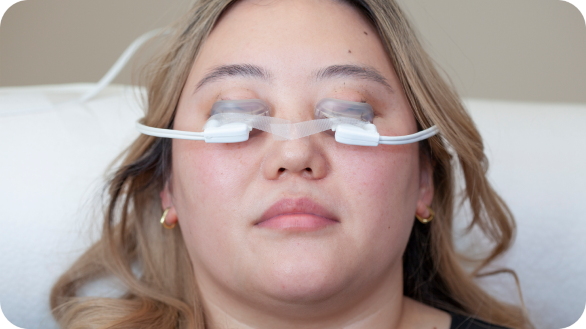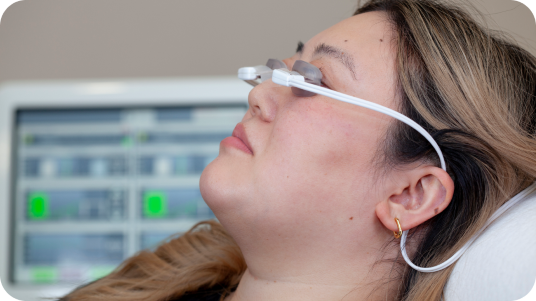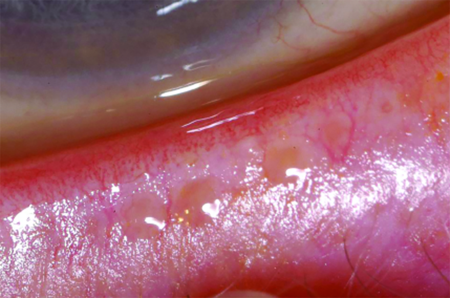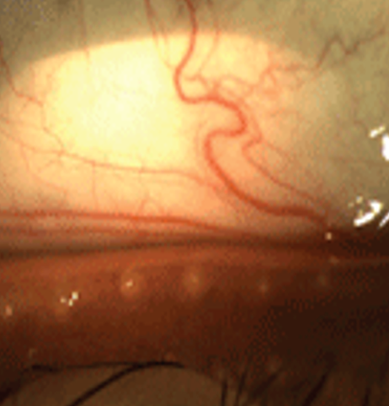MGD Treatment
700,000 TearScience™ LipiFlow™ treatments worldwide and growing.1

Dry Eye Symptom Relief Starts Here

If you have been told that your Dry Eye is MGD, it’s easy to do something about it. The TearScience™ LipiFlow™ treatment is a safe, comfortable, and effective eyelid massage that unblocks your meibomian glands.
Best of all, this dry eye treatment option can be done while resting in a chair right in your doctor’s office.
Planning for Cataract or Laser Vision Correction?
It’s been shown that Dry Eye caused by MGD can cause unsatisfactory vision and affect the overall results of both cataract and laser vision correction.2 Dry eye symptoms caused by MGD tend to worsen with surgical procedures if they are not treated.

The good news is that TearScience™ LipiFlow™ treatment can help optimize the ocular surface by stabilizing the tear film prior to surgery.3 In fact, in a recent study, patients treated with TearScience™ LipiFlow™ had a twofold reduction in dry eye symptoms 3 months after surgery.3
Do You Wish Your Contact Lenses Were Comfortable for Longer?
In one study, 60% of Contact lens wearers had signs of MGD.4

Do you feel as if your contacts do not fit correctly or that your vision fluctuates in and out during the day? Contact lens wear is a common condition contributing to dry eye symptoms and MGD. But a single TearScience™ LipiFlow™ treatment for MGD can increase your average comfortable soft contact lens wear time by up to 4 more hours on average.4 If you're struggling with your contact lenses, find an eye doctor near you and get screened for MGD.
Always wash hands thoroughly when handling lenses
TearScience™ LipiFlow™ Massages Your Eyelids to Remove Gland Blockage and Restore Gland Function

During the 12-minute treatment6, you can relax while the TearScience™ LipiFlow™ treatment system helps restore your blocked and obstructed glands, allowing them to secrete the necessary oils that keep your eyes healthy and protected.
In the vast majority of patients, no pain and/or discomfort was reported.6

The meibomian glands are heated and then gently massaged to melt the oil trapped within the glands. This automated treatment helps clear the gland obstruction and restore function.7
Other than an initial topical anesthetic drop prior to treatment, there are no other drugs required for this treatment.
TearScience™ LipiFlow™ Treatment Works to Restore Gland Oil Production
After the Activators are placed on your eyes, your TearScience™ LipiFlow™ treatment will begin. During the 12-minute treatment, the obstructed meibomian glands are warmed with controlled heat, and simultaneously massaged to remove trapped oil within the glands.7 Once the obstruction is cleared, your meibomian glands can function normally again, producing the healthy oil, or lipids, needed to maintain and protect a healthy tear film. This healthy gland function is needed for stable vision and ocular comfort. When the treatment is performed, the glands can improve normal oil, or lipid production, which is essential for maintaining and protecting a healthy tear film.

Functioning oil gland secretion

Thickened oil secretion
What Can You Expect After TearScience™ LipiFlow™ Treatment?
Results with TearScience™ LipiFlow™ can be experienced 6 to 8 weeks after treatment and may vary depending on the level of severity of MGD.7

Remember, TearScience™ LipiFlow™ only treats MGD, a leading underlying cause of Dry Eye, but there may be other factors associated with your disease. Therefore, dry eye symptoms may not fully resolve with TearScience™ LipiFlow™.
Dry Eye is a multifactorial condition and may require additional dry eye treatment options and adjunct therapy. Be sure to talk to your doctor about what’s right for you.
As with any medical procedure, risks and potential complications may occur. Please consult your eye care specialist for detailed information and to discuss these possible risks and complications with you prior to the procedure.
References:
- DOF2021MLT4003 - TearScienceTM LipiFlowTM (Tahoe Study) - A Post-Market Evaluation of LipiFlow Treatment in Cataract Surgery Practices CRS. May 18, 2021.
- Starr CE, et al. An algorithm for the preoperative diagnosis and treatment of ocular surface disorders. J Cataract Refract Surg. 2019 May;45(5): 669-684. REF2019TS4086.
- Data on file, 2018 (NCT01808560). Pilot study for treatment of meibomian gland dysfunction (MGD) prior to cataract surgery. Accessed from https://clinicaltrials.gov/show/NCT1808560. REF2019TS4108.
- Machalinska A, et al. Comparison of morphological and functional meibomian gland characteristics between daily contact lens wearers and nonwearers. Cornea. 2015 Sept;34(9):1098-1104. REF2022TS4005.
- Blackie CA, et al. A single vectored thermal pulsation treatment for meibomian gland dysfunction increases mean comfortable contact lens wearing time by approximately 4 hours per day. Clin Ophthalmol. 2018 Jan;12:169-183. REF2018TS4018.
- Lane SS, et al. A New System, the LipiFlow, for the Treatment of Meibomian Gland Dysfunction (MGD). Cornea. 2012;31(4):396-404. REF2017OTH0234.
- Blackie CA, et al. Treatment for meibomian gland dysfunction and dry eye symptoms with a single-dose vectored thermal pulsation: a review. Curr Opin Ophthalmol. 2015 Jul;26(4):306-313. REF2018TS4010.
- Blackie CA, et al. The sustained effect (12 months) of a single-dose vectored thermal pulsation procedure for meibomian gland dysfunction and evaporative dry eye. Clinical Ophthalmol. 2016; 10:1385-1396. REF2019TS4126.
PP2023TS4166
